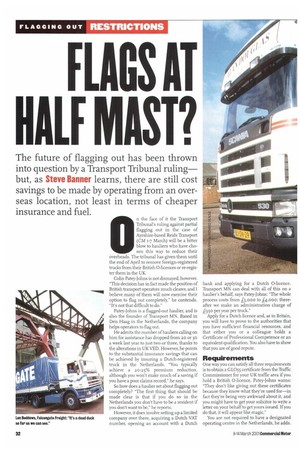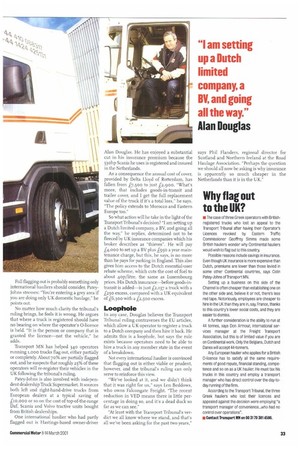FLAGS AT ALF MAST?
Page 34

Page 35

If you've noticed an error in this article please click here to report it so we can fix it.
The future of flagging out has been thrown into question by a Transport Tribunal ruling— but, as Steve Banner learns, there are still cost savings to be made by operating from an overseas location, not least in terms of cheaper insurance and fuel.
On the face of it the Transport Tribunal's ruling against partial flagging out in the case of Ayrshire-based Reids Transport (CM 1-7 March) will be a bitter blow to hauliers who have chosen this way to reduce their overheads. The tribunal has given them until the end of April to remove foreign-registered trucks from their British 0-licences or re-register them in the UK.
Cohn Patey-Johns is not dismayed, however. "This decision has in fact made the position of British transport operators much clearer, and I believe many of them will now exercise their option to flag out completely," he contends. "It's not that difficult to do."
Patey-Johns is a flagged-out haulier, and is also the founder of Transport MN. Based in Den Haag in the Netherlands, the company helps operators to flag out.
He admits the number ofhauliers calling on him for assistance has dropped from zo or 30 a week last year to just two or three, thanks to the alterations in UK VED. However, he points to the substantial insurance savings that can be achieved by insuring a Dutch-registered truck in the Netherlands. You typically achieve a 20-25% premium reduction, although you won't make much of a saving if you have a poor claims record," he says.
So how does a haulier set about flagging out completely? "The first thing that should be made dear is that if you do so in the Netherlands you don't have to be a resident if you don't want to be," he reports.
However, it does involve setting up a limited company over there, acquiring a Dutch VAT number, opening an account with a Dutch bank and applying for a Dutch 0-licence. Transport MN can deal with all of this on a haulier's behalf, says Patey-Johns: "The whole process costs from £3,000 to f.c000; thereafter we make an administration charge of f95o per year per truck.'
Apply for a Dutch licence and, as in Britain, you will have to prove to the authorities that you have sufficient financial resources, and that either you or a colleague holds a Certificate of Professional Competence or an equivalent qualification. You also have to show that you are of good repute.
Requirements
One way you can satisfy all three requirements is to obtain a GL055 certificate from the Traffic Commissioner for your UK traffic area if you hold a British 0-licence. Patey-Johns warns: "They don't like giving out these certificates because they know what they're used for—in fact they're being very awkward about it, and you might have to get your solicitor to write a letter on your behalf to get yours issued. If you do that, it will appear like magic."
You are not required to have a designated operating centre in the Netherlands, he adds. Full flagging out is probably something only international hauliers should consider, PateyJohns stresses: "You're entering a grey area if you are doing only UK domestic haulage," he points out.
No matter how much clarity the tribunal's ruling brings, he feels it is wrong. He argues that where a truck is registered should have no bearing on where the operator's 0-licence is held. "It is the person or company that is granted the licence—not the vehicle," he adds.
Transport MN has helped 340 operators running L000 trucks flag out, either partially or completely. About 70% are partially flagged out, and he suspects that roughly 25% of these operators will re-register their vehides in the UK following the tribunal's ruling.
Patey-Johns is also involved with independent dealership Truck Supermarket. It sources both left and right-hand-drive trucks from European dealers at a typical saving of Lio,000 or so on the cost of top-of-the-range Daf, Scania and Volvo tractive units bought from British dealerships.
One international haulier who had partly flagged out is Hastings-based owner-driver Alan Douglas. He has enjoyed a substantial cut in his insurance premium because the 53ohp Scania he uses is registered and insured in the Netherlands.
As a consequence the annual cost of cover, provided by Delta Lloyd of Rotterdam, has fallen from £7,500 to just £2,900. "What's more, that includes goods-in-transit and trailer cover, and I get the full replacement value of the truck if it's a total loss," he says. "The policy extends to Morocco and Eastern Europe too."
So what action will he take in the light of the Transport Tribunal's decision? "Jam setting up a Dutch limited company, a By, and going all the way," he replies, determined not to be fleeced by UK insurance companies which his broker describes as -thieves". He will pay £4,000 to set up a BV plus £95o a year maintenance charge, but this, he says, is no more than he pays for parking in England. This also gives him access to the Dutch essential-user rebate scheme, which cuts the cost of fuel to about 4op/litre, the same as Luxembourg prices. His Dutch insurance—before goods-intransit is added—is just £2,537 a truck with a £250 excess, compared with a UK equivalent of f6,3oo with a £2,500 excess.
Loophole
In any case, Douglas believes the Transport Tribunal ruling contravenes the EU articles, which allow a UK operator to register a truck to a Dutch company and then hire it back. He admits this is a loophole, but says the rule exists because operators need to be able to hire a truck in any member state in the event of a breakdown.
Not every international haulier is convinced that flagging out is either viable or prudent, however, and the tribunal's ruling can only serve to reinforce this view.
"We've looked at it, and we didn't think that it was right for us," says Len Beddows, who owns Falcongate Freight. "The recent reduction in VED means there is little percentage in doing so, and it's a dead duck so far as we can see."
"At least with the Transport Tribunal's verdict we all know where we stand, and that's all we've been asking for the past two years," says Phil Flanders, regional director for Scotland and Northern Ireland at the Road Haulage Association. "Perhaps the question we should all now be asking is why insurance is apparently so much cheaper in the Netherlands than it is in the UK."
Why flag out to the UK?
• The case of three Greek operators with Britishregistered trucks who lost an appeal to the Transport Tribunal after having their Operator's Licences revoked by Eastern Traffic Commissioner Geoffrey Simms made some British hauliers wonder why Continental hauliers would wish to flag out to this country.
Possible reasons include savings in insurance. Even though UK insurance is more expensive than Dutch, premiums are lower than those levied in some other Continental countries, says Colin Patey-Johns of Transport MN.
Setting up a business on this side of the Channel is often cheaper than establishing one on the other side and, believe it or not, there's less red tape, Notoriously, employees are cheaper to hire in the UK than they are in, say, France, thanks to this country's lower social costs, and they are easier to dismiss.
A further consideration is the ability to run at 44 tonnes, says Don Armour, international services manager at the Freight Transport Association, but this is of limited value if you are on Continental work. Only the Belgians, Dutch and Danes will accept 44-tonners.
Any European haulier who applies for a British 0-licence has to satisfy all the same requirements of good repute, financial standing, competence and so on as a UK haulier. He must tax his trucks in this country and employ a transport manager who has direct control over the day-today running of the firm.
According to the Transport Tribunal, the three Greek hauliers who lost their licences and appealed against the decision were employing 'a transport manager of convenience...who had no control over operations".
• Contact Transport MN on 00 31 70 3131 4580.
































































































